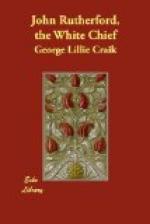Marsden, on asking a New Zealander what he conceived the atua to be, was answered—“An immortal shadow.” Although possessed, however, of the attributes of immortality, omni-presence, invisibility, and supreme power, he is universally believed to be in disposition merely a vindictive and malignant demon.
When one of the missionaries had one day been telling a number of them of the infinite goodness of God, they asked him if he was not joking with them. They believe that whenever any person is sick, his illness is occasioned by the atua, in the shape of a lizard, preying upon his entrails; and, accordingly, in such cases, they often address the most horrid imprecations and curses to the invisible cannibal, in the hope of thereby frightening him away. They imagine that at other times he amuses himself in entangling their nets and oversetting their canoes. Of late years they have suspected that he has been very angry with them for having allowed the white men to obtain a footing in their country, a proof of which they think they see in the greater mortality that has recently prevailed among them. This, however, they at other times attribute to the God of the Christians, whom they also denounce, accordingly, as a cruel being, at least to the New Zealander. Sometimes they more rationally assign as its cause the diseases that have been introduced among them by the whites. Until the whites came to their country, they say, young people did not die, but all lived to be so old as to be obliged to creep on their hands and knees.
The white man’s God they believe to be altogether a different being from their own atua. Marsden, in one of his letters, relates a conversation he had upon this subject with some of the chiefs’ sons who resided with him in New South Wales. When he told them that there was but one God, and that our God was also theirs, they asked him if our God had given us any sweet potatoes, and could with difficulty be made to see how one God should give these to the New Zealander and not equally to the white man; or, on the other hand, how he should have acted so partially as to give to the white man only such possessions as cattle, sheep, and horses, which the New Zealander as much required. The argument, however, upon which they seem most to have rested, was:—“But we are of a different colour from you; and if one God made us both, he would not have committed such a mistake as to make us of different colours.” Even one of the chiefs, who had been a great deal with Marsden, and was disposed to acknowledge the absurdity both of the “taboo” and of many of his other native superstitions, could not be brought to admit that the same God who made the white men had also made the New Zealanders.




